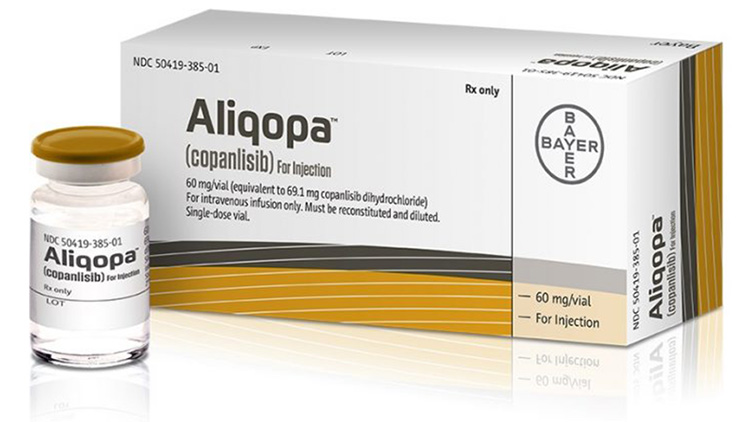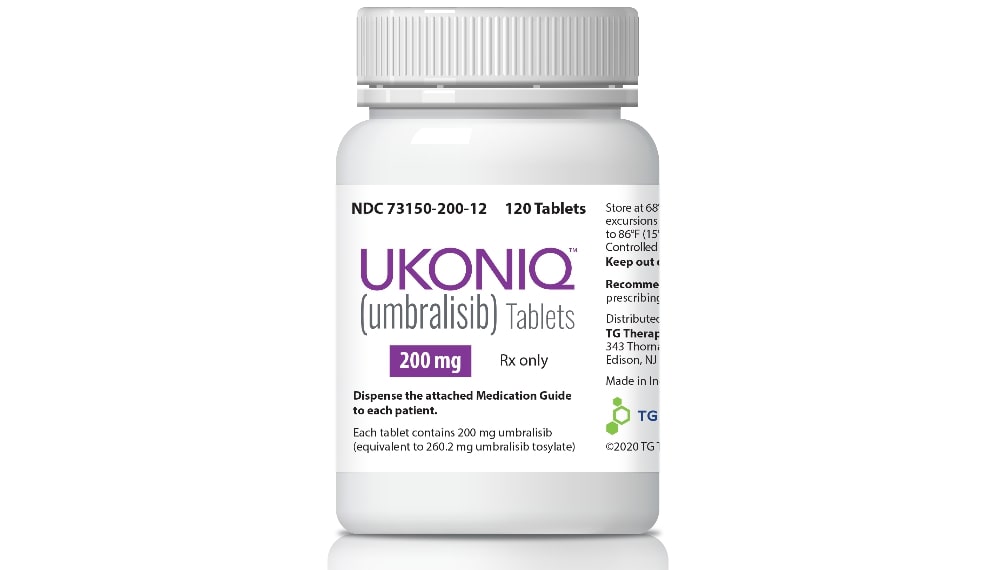Aliqopa (copanlisib) vs Ukoniq (umbralisib)
Aliqopa (copanlisib) vs Ukoniq (umbralisib)
Aliqopa (copanlisib) is a kinase inhibitor specifically designed to target and inhibit the phosphoinositide 3-kinase (PI3K) pathway, which is known to play a role in the growth and survival of certain cancer cells; it is approved for the treatment of adult patients with relapsed follicular lymphoma. Ukoniq (umbralisib), on the other hand, is a dual inhibitor of PI3K-delta and casein kinase-1 epsilon, and it is indicated for the treatment of adult patients with marginal zone lymphoma (MZL) who have received at least one prior anti-CD20-based regimen and adult patients with follicular lymphoma (FL) who have received at least three prior systemic therapies. When deciding between these two medications, a patient should consider the specific type of lymphoma they have, their previous treatments, as well as the unique safety profiles and dosing schedules of each medication, in consultation with their healthcare provider.
Difference between Aliqopa and Ukoniq
| Metric | Aliqopa (copanlisib) | Ukoniq (umbralisib) |
|---|---|---|
| Generic name | copanlisib | umbralisib |
| Indications | Relapsed follicular lymphoma | Marginal zone lymphoma, Follicular lymphoma |
| Mechanism of action | PI3K inhibitor, predominantly against PI3K-alpha and PI3K-delta | PI3K-delta and CK1-epsilon inhibitor |
| Brand names | Aliqopa | Ukoniq |
| Administrative route | Intravenous | Oral |
| Side effects | Hypertension, hyperglycemia, diarrhea, decreased neutrophil count, etc. | Increased creatinine, diarrhea, fatigue, musculoskeletal pain, etc. |
| Contraindications | None known | None known |
| Drug class | Antineoplastic agent, PI3K inhibitor | Antineoplastic agent, PI3K inhibitor |
| Manufacturer | Bayer | TG Therapeutics |
Efficacy
Aliqopa (Copanlisib) Efficacy in Treating Lymphoma
Aliqopa (copanlisib) is a kinase inhibitor specifically designed to target and inhibit the phosphoinositide 3-kinase (PI3K) pathway, which is known to play a significant role in the growth and survival of many cancer cells. Copanlisib has shown efficacy in the treatment of adult patients with relapsed follicular lymphoma who have received at least two prior systemic therapies. The approval of Aliqopa for this indication was based on the overall response rate observed in clinical trials. In the pivotal CHRONOS-1 clinical trial, the drug demonstrated a 59% overall response rate with a median duration of response of 12.2 months, which is considered a significant therapeutic benefit for patients with this type of lymphoma who have limited treatment options.
Ukoniq (Umbralisib) Efficacy in Treating Lymphoma
Ukoniq (umbralisib) is another novel medication that targets the PI3K pathway, more specifically the PI3K-delta and casein kinase-1 epsilon (CK1-epsilon). Umbralisib has been approved for the treatment of adult patients with marginal zone lymphoma (MZL) who have received at least one prior anti-CD20-based regimen and for adult patients with follicular lymphoma who have received at least three prior systemic therapies. In clinical trials, umbralisib showed an overall response rate of 49% in patients with MZL and 43% in patients with follicular lymphoma. These results indicate that Ukoniq can provide a meaningful clinical benefit to patients with these types of lymphoma, especially considering the prior treatments they have undergone.
Comparison of Efficacy in Lymphoma Treatment
When comparing the efficacy of Aliqopa and Ukoniq, it is important to consider the specific type of lymphoma and the patient's treatment history. Both drugs have shown promise in treating relapsed or refractory follicular lymphoma, with Aliqopa demonstrating a slightly higher overall response rate in its pivotal trial. However, the direct comparison of overall response rates should be approached with caution, as the trial designs and patient populations may differ. Both medications offer valuable options for patients with limited treatments available, and the choice of therapy should be individualized based on the patient's overall health status, prior treatments, and specific disease characteristics.
Conclusion on the Efficacy of Aliqopa and Ukoniq for Lymphoma
In conclusion, both Aliqopa (copanlisib) and Ukoniq (umbralisib) have demonstrated efficacy in the treatment of certain types of lymphoma. Aliqopa is particularly effective for patients with relapsed follicular lymphoma, while Ukoniq has shown efficacy in both marginal zone lymphoma and follicular lymphoma after multiple prior therapies. The use of these medications represents an important advancement in the treatment of lymphoma, providing new hope and options for patients who have previously seen limited success with other therapies. As with all treatments, the decision to use Aliqopa or Ukoniq should be made in close consultation with a healthcare provider, taking into account the specifics of the patient's condition and medical history.
Regulatory Agency Approvals
Aliqopa
-
Food and Drug Administration (FDA), USA

Ukoniq
-
Food and Drug Administration (FDA), USA

Access Aliqopa or Ukoniq today
If Aliqopa or Ukoniq are not approved or available in your country (e.g. due to supply issues), you can access them via Everyone.org.
How it works

Make an enquiry
Choose the medicine you want to buy, answer a couple of questions, and upload your prescription to speed things up. We’ll get back to you within 24 hours.


Make an enquiry
Choose the medicine you want to buy, answer a couple of questions, and upload your prescription to speed things up. We’ll get back to you within 24 hours.


Breeze through the paperwork
We'll guide you through the required documents for importing unapproved medicine, ensuring you have all the necessary information.


Get a personalized quote
We’ll prepare a quote for you, including medicine costs and any shipping, administrative, or import fees that may apply.


Receive your medicine
Accept the quote and we’ll handle the rest - sourcing and safely delivering your medicine.

Some text on this page has been automatically generated. Speak to your physician before you start a new treatment or medication.
Let's talk
If you have any questions, call us or send us a message through WhatsApp or email:
Contact us




